
News |
- Shell Arctic Drilling Adrift in Stormy Seas
- BC Premier Questions Pipeline, Albertans Call for Inquiry
- Peat Mine Expansion Comments Due July 24, 2012
- Mike Holmes is "Radically Canadian"
- Manitoba Releases New "Green Plan"
- World Heritage Site Inches Forward: Two More First Nations Submit Lands Plans
- Red List Misses Thousands of Species
- The State of Canada's Birds 2012
- Canadians Among 2012 Blue Planet Laureates
- CEAA Registry Saved From Trash
- Canadian Groups Respond to Canada's Bad Faith and Blocking Role at Rio+20
- New Happy Planet Index Pans Canada
| Shell Arctic Drilling Adrift in Stormy Seas | 20 July 12 |
 The Arctic is know for extreme weather conditions, freezing temperatures and violent storms on the Arctic Ocean are legendary. It remains to be seen if oil giant Shell is up to the reality of Arctic Ocean operations. On July 14, 2012 the Royal Dutch Shell exploration ship Discoverer's anchor failed in stiff winds and ran aground.
The Arctic is know for extreme weather conditions, freezing temperatures and violent storms on the Arctic Ocean are legendary. It remains to be seen if oil giant Shell is up to the reality of Arctic Ocean operations. On July 14, 2012 the Royal Dutch Shell exploration ship Discoverer's anchor failed in stiff winds and ran aground.With a lawsuit in U.S. Federal courts contesting the lax standards Shell is being allowed to operate under, safety of both workers and of the environment falls into question. The lawsuit invokes the U.S. Clean Water Act, the Endangered Species Act and Oil Pollution Act, statingthe Bureau of Safety and Environmental Enforcement (BSEE) signed off on Shell's exploration plans despite oil spill plans requiring greater scrutiny. Shell's plan to drill a thousand miles away from the nearest population centre means the ability to deal with spills is limited. The containment barge Shell was expecting to make use of has not passed inspection by the Coast Guard. Royal Dutch Shell is attempting to get the Coast Guard to relax certification standards so it can use the thirty-seven year old Arctic Discoverer. Shell has published lengthy documentation on it's spill prevention and oil recovery plan, none of the actual machinery has ever been successfully tested in the Arctic. View July 15, 2012 The International articleView July 15, 2012 Los Angeles Times article View July 11, 2012 Greenpeace article View July 16, 2012 Anchorage Daily News article View United States Environmental Protection Agency Summary of the Clean Water Act View United States Environmental Protection Agency Oil Pollution Act Overview |
|
 Print version Print version |
Top |
| BC Premier Questions Pipeline, Albertans Call for Inquiry | 13 July 12 |
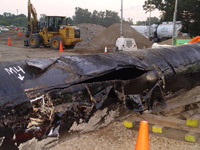 The United States (US) National Transportation Safety Board (NTSB) issued a scathing report July 10, 2012 finds that Alberta-based Enbridge had poorly maintained a section of pipeline that ultimately spilled 20,000 barrels (nearly 3.2 million litres) of diluted bitumen from Alberta's oilsands into the Kalamazoo River in Michigan July 25, 2010.
The United States (US) National Transportation Safety Board (NTSB) issued a scathing report July 10, 2012 finds that Alberta-based Enbridge had poorly maintained a section of pipeline that ultimately spilled 20,000 barrels (nearly 3.2 million litres) of diluted bitumen from Alberta's oilsands into the Kalamazoo River in Michigan July 25, 2010.Enbridge currently proposes to build a $5.5-billion, 1,177-kilometre Northern Gateway pipeline from the oilsands in northern Alberta to the west coast of British Columbia (BC). The US NTSB report has only served to bolster already strong opposition to the Northern Gateway pipeline [in Canada.] "I think the company should be deeply embarrassed about what unfolded. If they think they're going to operate like that in British Columbia – forget it," said BC Premier Christy Clark. In Alberta the NTSB report, and a spat or recent pipeline spills, prompted more than 50 provincial organizations representing a broad cross-section of Alberta's population to issue an open letter calling on Alberta Premier Alison Redford to establish an independent inquiry into pipeline safety in Alberta. View July 25, 2012 United States (US) National Transportation Safety Board (NTSB) reportView July 12, 2012 Alberta Surface Rights Group/Council of Canadians press release View July 11, 2012 Globe and Mail coverage View July 11, 2012 Metro News coverage View July 10, 2012 United States National Transportation Safety Board (NTSB) press release View July 10, 2012 Pembina Institute blog post View July 10, 2012 CBC News coverage View more information on Manitoba Wildlands Energy Development page View July 13, 2012 Toronto Star article View July 13, 2012 Vancouver Sun article View July 13, 2012 Calgary Herald article Sources:
US NTSB, Globe and Mail, Alberta Surface Rights Group/Council of Canadians
|
|
 Print version Print version |
Top |
| Peat Mine Expansion Comments Due July 24, 2012 | 13 July 12 |
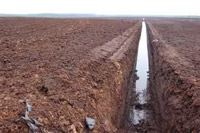 Manitoba Conservation and Water Stewardship Environmental Assessments and Licensing Branch (EALB) have received another application for an Environment Act license to expand a peat-mining operation in Manitoba.
Manitoba Conservation and Water Stewardship Environmental Assessments and Licensing Branch (EALB) have received another application for an Environment Act license to expand a peat-mining operation in Manitoba.Sunterra Horticulture Inc. applied for an Environment Act license to expand peat mining operations in the Bullhead, Little Deer Lake and Ramsay Point Bogs located approximately 40 and 80 km north of Riverton, Manitoba. The public has until July 24, 2012 to submit comments to Manitoba Environment Officer Darrell Ouimet (darrell.ouimet@gov.mb.ca) on the proposed peat mine. The proposed peat mine expansion is located within the traditional territories of Bloodvein River First Nation, Fisher River First Nation, and within both the traditional territory and treaty land entitlement notice zone of Peguis First Nation. Adequate consultations between the Crown and the affected First Nations have not yet taken place. View Environment Act Public Registry File #4254.10 onlineView June 21, 2012 Notice of Sunterra Peat Mine Development (File #4254.10) Application (PDF) View July 1, 2012 Winnipeg Free Press article View more information on Manitoba Wildlands Peat Mining in Manitoba page |
|
 Print version Print version |
Top |
| Mike Holmes is "Radically Canadian" | 13 July 12 |
 "I have a radical idea. Let's make Canada a leader in energy efficiency, responsible use of resources, green jobs for young people, and innovation!" stated Mike Holmes, a professional contractor and the host of several television shows on home renovations.
"I have a radical idea. Let's make Canada a leader in energy efficiency, responsible use of resources, green jobs for young people, and innovation!" stated Mike Holmes, a professional contractor and the host of several television shows on home renovations.Holmes made the comments in support of the David Suzuki Foundation's "Radically Canadian" campaign. The campaign is a reaction to Canada's federal government's undermining of long-standing Canadian environmental laws and labelling of environmentalists as "un-Canadian," "foreign-funded money-launderers," and "radicals." "Citizens throughout the country have joined us and shared their dismay at how brazenly the federal government pushed through a bill that will dismantle vital environmental protections that were created through decades of science and public input," said Peter Robinson, CEO of the David Suzuki Foundation. "It's clear that Canadians see the need to make the right choices now to create a sustainable future," said Holmes. In an episode of CBC's television show "Rick Mercer Report," most recently airing June 26, 2012, Mike Holmes and Dr. David Suzuki make cameo appearances to help install solar panels on houses in Oshawa, Ontario. "The thing about sunlight that is wonderful, is that every country in the world has access to the sun, so it is not a matter of a few rich countries that happen to have big deposits of oil or coal. ... All the countries have access to this [solar power]," said Dr. David Suzuki. View June 28, 2012 David Suzuki Foundation press releaseView June 21, 2012 Mike Holmes The Holmes Spot blog post View May 4, 2012 Toronto Star coverage View October 11, 2011 Toronto Atmospheric Fund Eighty-by-Fifty blog post View October 3, 2011 Mike Holmes & David Suzuki blog post Watch video of Mike Holmes and David Suzuki on CBC's Rick Mercer Report Sources:
David Suzuki Foundation, Mike Holmes, Rick Mercer Report
|
|
 Print version Print version |
Top |
| Manitoba Releases New "Green Plan" | 6 July 12 |
 Manitoba released Tomorrow Now: Manitoba's Green Plan June 15, 2012. The 54 page eight-year strategic plan calls for up to 16 new environmental plans or strategies, plus changes to existing laws and policies. There is no crown lands, parks or protected areas plan included.
Manitoba released Tomorrow Now: Manitoba's Green Plan June 15, 2012. The 54 page eight-year strategic plan calls for up to 16 new environmental plans or strategies, plus changes to existing laws and policies. There is no crown lands, parks or protected areas plan included.Examples of strategies/plans include:
New laws, regulations, policies and programs called for, include:
The new green plan does not contain a firm target for greenhouse gas emissions. The government failed to meet its previous target — a six per cent drop from 1990 levels by 2012. The number was based on the Kyoto Protocol and enshrined in provincial law. "Before any other targets are concluded, it's absolutely critical that we have a mandatory reporting of emissions," Manitoba Conservation Minister Gord Mackintosh acknowledged, adding "You can't cut what you can't count." View Tomorrow Now: Manitoba's Green PlanView June 15, 2012 Government of Manitoba Press Release View June 15, 2012 Canadian Press coverage View June 15, 2012 Winnipeg Free Press coverage View June 15, 2012 Ducks Unlimited press release View June 15, 2012 Canadian Boreal Initiatives press release View June 16, 2012 Winnipeg Free Press coverage View more information on Manitoba Wildlands Governments page Source:
Government of Manitoba, Canadian Press
|
|
 Print version Print version |
Top |
| World Heritage Site Inches Forward: Two More First Nations Submit Lands Plans | 6 July 12 |
 One of the world's last remaining areas of intact southern boreal forest is a step closer to becoming a United Nations Educational, Scientific and Cultural Organization (UNESCO) World Heritage Site.
One of the world's last remaining areas of intact southern boreal forest is a step closer to becoming a United Nations Educational, Scientific and Cultural Organization (UNESCO) World Heritage Site.Little Grand Rapids and Pauingassi, two Manitoba First Nations, submitted land-management plans to the Provincial government June 2012. Both are among the five First Nations who initiated the World Heritage Site undertaking in 2002. The lands plans have been officially submitted to the province for approval and will be finalized following a period of public review. The public has until August 8, 2012 to submit comments on the two proposed lands plans. Polar River First Nation and Bloodvein First Nation have also submitted land management plans. Poplar River's plan was submitted September 2005 and approved June 2011, and Bloodvein plan was approved January 2012. Five First Nations started the designation bid in 2002 and will manage the lands with the Governments of Ontario and Manitoba. Manitoba and Ontario nominated 33,400 square kilometres of boreal forest, rivers, lakes and wetlands spread across eastern Manitoba and into Ontario as a UNESCO World Heritage Site candidate January 18, 2012. The nominated area includes the already established Atikaki Provincial Park in Manitoba and Woodland Caribou Provincial Park in Ontario. View June 21, 2012 Government of Manitoba press releaseView June 21, 2012 Winnipeg Free Press coverage View Little Grand Rapids and Pauingassi Traditional Use Planning Area Proposals View UNESCO website View Manitoba Wildlands Manitoba World Heritage Site page View Manitoba Wildlands Protected Areas/Parks Reviews page View more information on Manitoba Wildlands Protected Areas Announcements page Sources:
Government of Manitoba, Little Grand Rapids, Pauingassi
|
|
 Print version Print version |
Top |
| Red List Misses Thousands of Species | 29 June 12 |
 The International Union for Conservation of Nature's (IUCN) 2012 Red List has been released with almost 250 new additions. 63, 837 species have been assessed. Nearly all the world's mammals, thirteen percent of the world's birds, and a shocking 41% of all amphibians are threatened with extinction.
The International Union for Conservation of Nature's (IUCN) 2012 Red List has been released with almost 250 new additions. 63, 837 species have been assessed. Nearly all the world's mammals, thirteen percent of the world's birds, and a shocking 41% of all amphibians are threatened with extinction."Expanding both the number and diversity of species assessed on the IUCN Red List is imperative to have a clear understanding of our impact on the natural world," says Richard Edwards, Chief Executive of Wildscreen. Wildscreen is working with the IUCN Red List to raise awareness of endangered species. Further genetic analysis of shark species has lead to the discovery of 79 potential new species of shark. The IUCN has only assessed about half of the world's shark and ray species. A study out of the College of Charleston in South Carolina has done a DNA analysis of 4, 383 species of shark and ray and discovered hidden species. "This will have an impact on what is considered endangered and the fragility of different organisms," lead author Gavin Naylor with the College of Charleston in South Carolina. View June 28, 2012 Mongabay.com articleView June 6, 2012 Nature.com article View June 25, 2012 Scientific American View June 29, 2012 Nature.com article View IUCN Red List website |
|
 Print version Print version |
Top |
| The State of Canada's Birds 2012 | 29 June 12 |
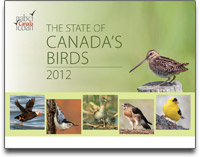 The first comprehensive study of Canada's bird population, released by the North American Bird Conservation Initiative, cites a serious decline in avian population. The thirty-six page report says there has been a twelve percent decline in Canada's avian population since the 1970s.
The first comprehensive study of Canada's bird population, released by the North American Bird Conservation Initiative, cites a serious decline in avian population. The thirty-six page report says there has been a twelve percent decline in Canada's avian population since the 1970s."The State of Canada's Birds report is a measurable indicator of how well we are fulfilling our shared responsibility as stewards of our nation's wildlife and wilderness areas. Clearly there is much we can do to ensure we have healthy ecosystems for years to come, and this report provides a path to do so." Ian Davidson, Executive Director, Nature Canada "The findings of The State of Canada's Birds report clearly demonstrate the immediate need to maintain, and in some areas increase, the diversity of wildlife habitat across Canada. Without habitat, there is no wildlife... it's that simple." L.G. "Len" Ugarenko, President/Président, Wildlife Habitat Canada View The State of Canada's Birds 2012 websiteView The State of Canada's Birds Report 2012 View June 27, 2012 CBC News article View June 23, 2012 CBC News article |
|
 Print version Print version |
Top |
| Canadians Among 2012 Blue Planet Laureates | 29 June 12 |
 The twentieth annual Blue Planet Prize were handed out at the United Nations Rio+20 Conference on Sustainable Development held in Rio De Janeiro Brazil June 2012.
The twentieth annual Blue Planet Prize were handed out at the United Nations Rio+20 Conference on Sustainable Development held in Rio De Janeiro Brazil June 2012.The Blue Planet Prize, given by Japan's Asahi Glass Foundation to leaders who make a difference in safeguarding biodiversity, is one of the world's premier environmental prizes, often referred to as the Nobel Prize for environmentalists. Three recipients were awarded the prize for 2012: William Rees, a professor emeritus at the University of British Columbia, Rees's former doctoral student and current president of the Global Footprint Network Dr. Mathis Wackernagel, and Dr. Thomas E. Lovejoy. Rees and Wackernagel were given the award for developing the Ecological Footprint, a comprehensive accounting system that measures human carrying capacity and helps assess the risks to planetary stability from overconsumption. Lovejoy was awarded the prize for becoming the first person to clarify human caused habitat fragmentation that damaged biodiversity and gave rise to environmental crisis. This year's winners join a veritable who's who in the conservation world, with past winners that include Lester Brown, James Lovelock, David Brower, Paul Ehrlich, Theo Colborn, Gustave Speth, Amory Lovins, and James Hansen. View Asahi Glass Foundation, List of Blue Planet Prize Laureates View Global Footprint NetworkView June 22, 2012 Digital Journal press release View June 19, 2012 Yale Environment 360 interview View June 18, 2012 National Geographic article View June 17, 2012 Vancouver Sun article Sources:
Asahi Glass Foundation, National Geographic
|
|
 Print version Print version |
Top |
| CEAA Registry Saved From Trash | 22 June 12 |
 A detailed listing of 3,309 projects, with their official documentation, that were underway through the Canadian Environmental Assessment Act (CEAA), were to be "systematically terminated" and taken down from the CEAA government website, according to an internal government e-mail.
A detailed listing of 3,309 projects, with their official documentation, that were underway through the Canadian Environmental Assessment Act (CEAA), were to be "systematically terminated" and taken down from the CEAA government website, according to an internal government e-mail.The omnibus budget Bill C-38, recently passed by the Canadian House of Commons in a marathon amendments voting session, completely rewrites the Canadian Environmental Assessment Act (CEAA, 2012) and eliminates screenings, subject to ministerial exceptions. "Current screenings (including those that are still identified as on hold) will be systematically terminated and removed from the Internet site," the Canadian Environmental Assessment Agency wrote in the email. The news sent government workers scrambling to create their own internal databases of the cancelled assessments, before the Canadian Environmental Assessment Agency made an about face and decided to archive the records for public viewing instead. Isabelle Perrault, spokeswoman for the Canadian Environmental Assessment Agency, at first denied that the records would be wiped from the system. Perrault later acknowledged: "the possibility of removing all elements of the old registry and developing a completely new registry with none of the old information was among the options we considered." View June 21, 2012 Nova Scotia Chronicle Herald coverageView Canadian Environmental Assessment Agency (CEAA) Registry |
|
 Print version Print version |
Top |
| Canadian Groups Respond to Canada's Bad Faith and Blocking Role at Rio+20 | 22 June 12 |
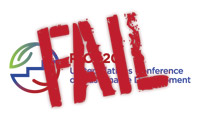 Canadians in Rio and back home issued the following statements.
Canadians in Rio and back home issued the following statements."As environmental non-profit organizations we also know that the Harper govenment's aggressive campaign to silence any dissenting voice, especially from environmentalist, is a far cry from the picture of constructive collaboration that Minister Kent sought to draw in his speech today." said Christian Holz, Executive Director of Climate Action Network Canada. "After it received 5 consecutives Fossils of the years at U.N.'S climate change conference, Canada was the only nation singled out for its destructive policies on energy and extraction at the People's Summit here in Rio. What the Harper Government doesn't realize is that its abdication of environmental leadership and its commitment to a 'greed economy' has put Canada in the bulls eye of international social movements being mobilized through the Peoples' Summit here in Rio," says Tony Clarke, director of the Polaris Institute. (contact Richard Girard 21 79 32 05 12) "With regards to blocking an agreement on protecting 45% of the planet, the high seas – Canada, already a party to the UN Law of the Sea Convention and an active participant in the past six years of discussions at the United Nations on protecting areas beyond national jurisdiction, has no excuse for its position at Rio." – Susanna Fuller, Ecology Action Center. "Canada does not attend international environmental conferences in good faith. They pulled out of Kyoto immediately after returning from COP17 and have derailed progress here in Rio, all while gutting environmental regulations at home. Calling that good faith is an insult to people and the planet" – Amara Possian, PowerShift Canada "20 years ago, our government played a pivotal role in helping foster a new era of international cooperation. Today, our government has become a liability for the reputation of our country. Despite the weak agreement adopted in Rio, we will continue to hold the Harper's government feet to the fire on matters of sustainabiltiy, climate change and fossil fuel subsidies." said Steven Guilbeault of Équiterre. "Canada has been trampling our rights here in Rio and back home by expanding the controversial tar sands into our homeland and poisoning our water, air and earth, and negotiating on their behalf here at Rio+20. Our First Nation Rights are protected by both the Canadian constitution and the UN Declaration on the Rights of Indigenous Peoples. They guarantee our access our lands to hunt, fish, and forage, as well as our rights to clean air and water. Canada has just been singled out for these horrible environmental and social abuses at the final Assembly of the People's summit here in Rio." Said Crystal Lameman of Beaver Lake Cree Nation and Member of the Indigenous Environmental Network View June 22, 2012 CBC News blog postView June 18, 2012 Mongabay.com article View EarthSummit.ca article View Canadian Groups Respond to Canada's Bad Faith and Blocking Role at Rio+20 View June 16, 2012 Mongabay.com article |
|
 Print version Print version |
Top |
| New Happy Planet Index Pans Canada | 22 June 12 |
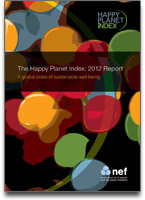 The new June 2012 HPI results show the extent to which 151 countries across the globe produce long, happy and sustainable lives for the people that live in them. The overall index scores rank countries based on their efficiency, how many long and happy lives each produces per unit of environmental output.
The new June 2012 HPI results show the extent to which 151 countries across the globe produce long, happy and sustainable lives for the people that live in them. The overall index scores rank countries based on their efficiency, how many long and happy lives each produces per unit of environmental output.Each of the three component measures – life expectancy, experienced well-being and Ecological Footprint – is given a traffic-light score based on thresholds for good (green), middling (amber) and bad (red) performance. These scores are combined to an expanded six-colour traffic light for the overall HPI score, where, to achieve bright green – the best of the six colours, a country would have to perform well on all three individual components. The scores for the HPI and the component measures can be viewed in map or table-form. By clicking on any individual country in the map or table you can explore its results in more detail. Canada is ranked 65th out of 151 countries rated. View The Happy Planet IndexView 2012 Happy Planet Index report View June 15, 2012 TckTckTck report View June 15, 2012 The Guardian article |
|
 Print version Print version |
Top |


 RSS Feeds:
RSS Feeds: